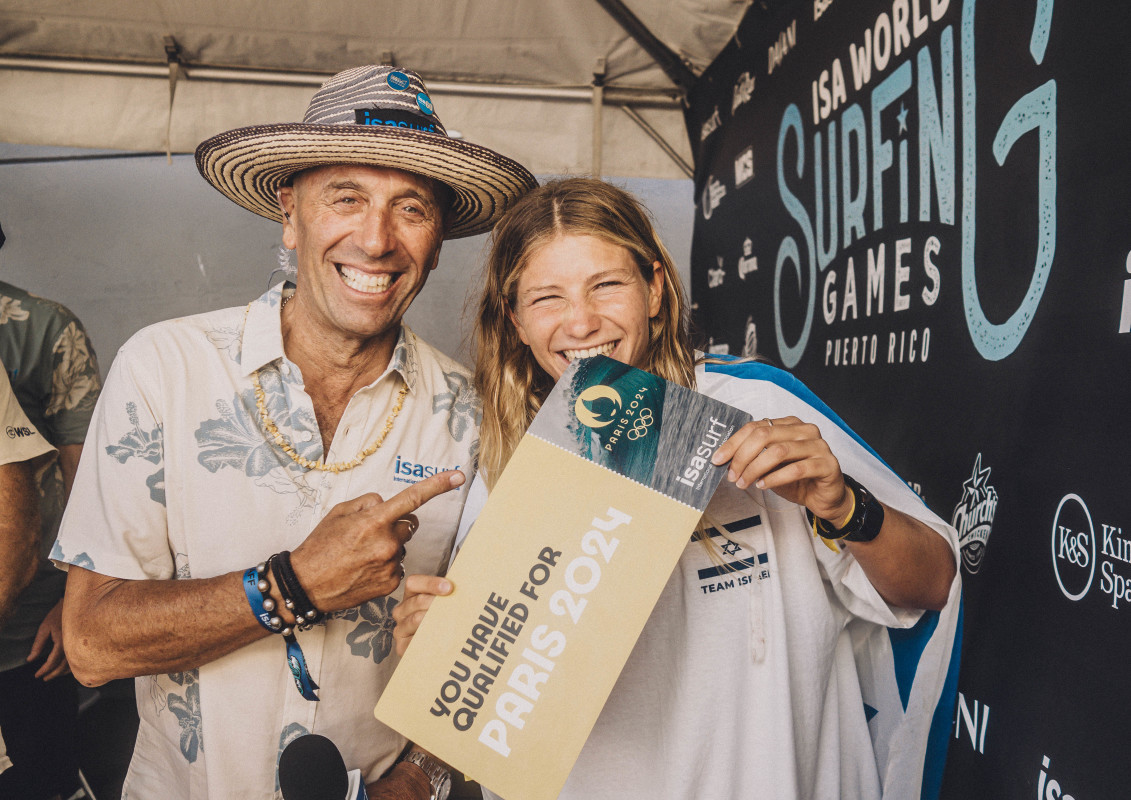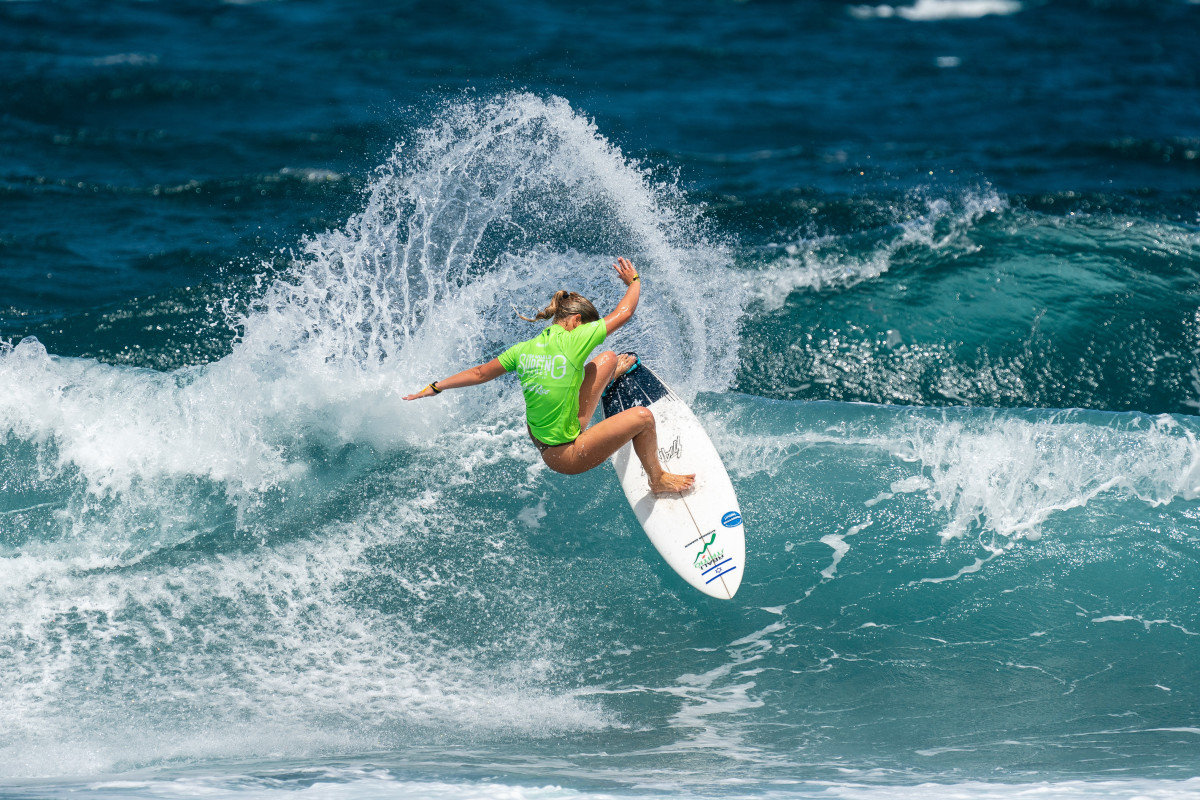
Pablo Franco/ISA
It’s safe to say, of all the Olympic qualifiers headed to the 2024 Paris Olympic Games, most athletes haven’t served military time for the country they’re representing. But Anat Lelior–the Tel Aviv surfer competing at Teahupo’o this summer for the nation of Israel–is not most athletes.
Before Lelior competed in the 2020 Tokyo Olympics, she started her mandatory two-year service for the Israeli Defense Forces. Being an athlete in the armed forces was no easy feat for the now 24-year-old, but she was up to the task. Since she finished her requirement, Lelior has spent her post-military time climbing the WQS ranks and gearing up for her upcoming performance at the slabby, reef-bottomed 2024 Olympic venue.
We recently caught up with Lelior to hear about her time in the military, the current Israel-Hamas conflict, and what she’s doing to prepare for an Olympic podium finish.

Pablo Jimenez/ISA
Congratulations on your upcoming Olympic journey! You’re in Tahiti right now?
Thank you! It’s super exciting… It’s been really fun over here. It’s been very down to earth because you don’t have a lot to do other than surf with people and maybe work out a little bit.
I’m doing the ISA camp here as well at the start of June. I’ll spend like two and a half weeks [in Tahiti] and go back home. Then in July, I’m going to come early to just surf until the Olympics and maybe after the Olympics. If I’m lucky enough to go [to] the actual Olympic Village and see the other [Israeli] teammates [I will], but I’m not sure because I have the ‘QS right after I’ll have to choose my priorities.
You are no stranger to winning. From 12 when you won your first Israeli women’s title and then winning 6 more times after that until you were 19. You were also the runner-up in the 2018 WSL Europe Pro Junior and not to mention the gold medal. This list goes on. You obviously love competitive surfing. What makes you love it so much?
I [like] the sense of control…once you have control over the heat, not over nature. But once you’re like in a good rhythm with the ocean, and you’re surfing and you have the right strategy, it’s all rewarding. I don’t want to compare it to like, let’s say a race from point A to point B, because it’s not comparable. You know, we’re dealing with nature. Everything can change–if it’s a different tide, wind, swell, different board.
Once you actually win a heat or a contest…it’s very rewarding because you feel like you beat nature–but only for a little bit. It’s like a five-second feeling that goes away, because as a competitor, I know that everybody wants to win everything.

Pablo Jimenez/ISA
In 2019, you defeated Isabella Nichols in the Deeply Pro Anglet QS event, which put you at number three in Europe. Are there any women surfers you’re hoping you get to surf against?
Carissa Moore. I know how much time she’s putting in here in Tahiti. I know backside is definitely going to be a little bit harder, but she’s amazing. I mean to me she’s not even a five-time world champ. She’s a [seven-time world champion].
I’m learning that even the ways to prepare [for an event] change. So, I’m trying to be flexible and to flow like the ocean. I just hope I will get to showcase my abilities in the barrel. I’m not very experienced but I love it so much so I hope the experience that I get here is going to be enough.
Speaking of the 2020 Olympics, how do you foresee this year’s Olympics being different than last time? How are you feeling about it?
COVID messed up a little bit of the Olympic spirit [for me]. [It] excluded us from the crowd and they separated us from each other. And even in the event, it was just us athletes supporting each other. You know, [there were] no fans stoked for us or yelling…we didn’t really feel like it was even a sporting event.
I was very stoked to know that the Olympics is in Tahiti, but at the same time, they are doing a little bit of the same thing – with this distance.
[Tahiti is] 20-something hours away from Paris. And as a former Olympian, who was told by my Olympian friends, that I kind of missed out on the [celebrations] in 2020 because of COVID, I’m going to give that all up again for being here [in Tahiti]. But as much as I am stoked to be an Olympian, I will give everything up for the best barrel of my life. So, I am a surfer before I’m an athlete.
How do you feel about a slabby wave like Teahupo’o?
It’s been a dream coming here. As soon as my siblings and I came, we could not believe that we were surfing – it’s unreal. Of course, I feel very, very scared. The first day I paddled out here I cried because I was completely like overloaded with emotions, didn’t know what was going to happen, and didn’t really have any guidance. But then a local that we’re staying with came up and told me he was going to help out. As much as I’m scared, I’m very very excited. Like every day [I can get] the wave of my life.

Jersson Barboza/ISA
You had bad hip and ankle injuries that put you out of surfing for a few years– how have you bounced back from them?
I am a hard-working person and I’m very stubborn…it’s something that you cannot take away from me until I decide to quit surfing.
But realized I could lean on people and talk my feelings out. My physiotherapist is such an amazing human being, he is an Israeli guy…Dean Shemesh. He’s going to be here with me during the Olympics.
It took me a long time to recover because they missed out on some problems and it took me even [further] backward. When I started surfing again, [I reinjured myself] again. And then I met him, and we [started from] the base [of the injury] again and grew from there. Then after a year and a half of recovery, I injured my ankle again.
It took me another five-to-six months to go back [to normal]. Usually, I see athletes recover a lot faster. It was probably the hardest thing—having social media showing me a lot of people recovering a lot faster than I am but I’m still to this day trying to accept that the amount of time it takes for me to recover is different than everybody else; it doesn’t mean I’m weaker. It’s just it is what it is.
You served in the Israeli Defense Forces for two years when you were 18. What was it like serving while upholding a surf career?
The military is all about discipline. As an athlete, I think I already had that, so it wasn’t really hard for me. The military is a very, very tough system to balance your needs with, so it was really, really hard finding better ways to train and be comfortable doing everything. But in the end, those were the years I succeeded most. I met great people along the way, and I learned how to use a gun, which I will probably never [use] again.
In the tumultuous world with the Israel-Hamas war, despite cultural divides, you have related surfing to be a great connector. What is the legacy you hope to lead and how do you see surfing used to build bridges and promote understanding?
I feel like this war has taken so much from people, my people, and war is an ugly thing. There aren’t pretty sides to war. It made me connect to my people a lot more, I can say that.
If there was one thing that I respected about the ISA, the right people were mature enough to separate the fact that I’m Israeli. They saw me as Anat before where I come from…It’s a very sad situation sometimes where people are not mature enough to separate [the human being from where they come from].
But I will not choose to be mad about it. Sometimes it comes out of lack of interest—people are just reading titles and I guess facts these days are not as viral as headlines. It’s sad, but I choose to smile about it because you need to spread kindness, not hate. I feel like that’s what we Israelis are trying to do more. At least Israeli surfers are supporting only peace and love.

Pablo Jimenez/ISA
Do you see surfing building connections?
When I was 14, I [participated in] Surfing for Peace where I met people from other countries. I cannot say which ones, but I met people who were far away from being at peace with us. But we were just surfing and if we did have politics to talk about, in the end, people were choosing to be at peace with each other. And yeah, to this day, I talk to them and we check in on each other.
I feel like surfing overall can be a bridge of good things…even to this day. There is a guy named Artur [Rashkovan] who sends surfboards to Gaza. I guess I feel like Israelis are trying to create beautiful moments, while Hamas is trying to do the opposite.
The surf conditions aren’t super consistent in Israel since it’s in the Mediterranean Sea. How have you adapted to become such a stellar surfer?
I’ve always been told I have talent and I believe in it now because there were times when I didn’t surf for a month or two. And then [I would] slowly get back to the same level. It’s been a slower process for me to get better. The last couple of years I’ve been spending more time abroad.
I feel like the hunger that we Israelis have is very similar to the hunger Brazilians have. The conditions are not very good at home, I can tell you that, but there are waves. It’s not like it’s terrible, but it’s definitely not consistent and then strangely, a pro surfer comes from there.
You are very driven, that’s no secret. What is your ultimate goal with your surf career?
I would love to win a gold medal. But definitely qualifying for the ‘CT, just competing with the best in the world and actually surfing good waves in heats is my ultimate dream. Being able to go for a year or two [on the WCT] would be amazing. First, I need to be kinder to myself and then go from there.

